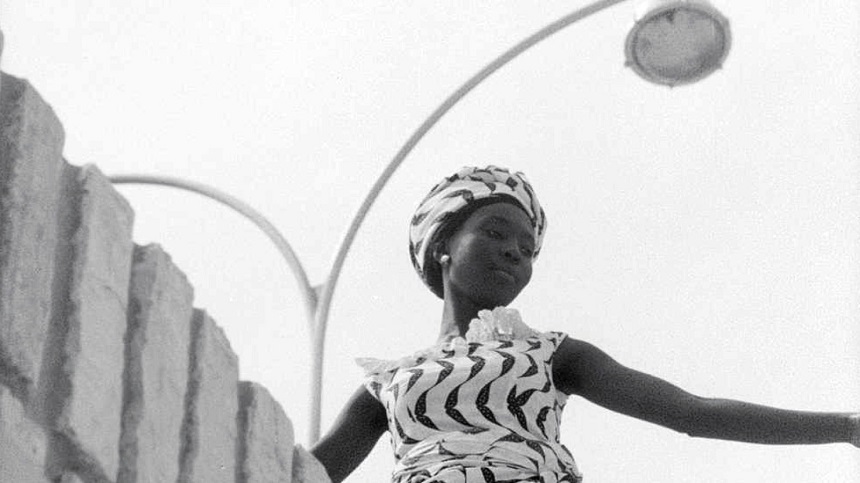Blu-ray Review: Criterion Enshrines Ousmane Sembène's BLACK GIRL
Ousmane Sembène's 1966 classic looks gorgeous as it joins the Criterion Collection.

After years of having it on my watchlist, I caught up with Senegalese director Ousmane Sembène's Moolaadé last year and enjoyed it a great deal, leaving me hungry for more. The Criterion Collection has conveniently sailed in to quench the thirst, with its January 24 release of Sembene's first feature film, Black Girl, which joins the collection at spine #852.
Black Girl saw its 50th anniversary last year and was restored by the World Cinema project in 4K resolution, the transfer that has been used for the disc here. The results are, predictably, terrific: aside from a handful of shots which still retain some visible spots in places, the digital print is crackling sharp, keeping its beautiful grain alive while betraying none of the gorgeous contrast of Sembène's black and white photography.
The film concerns the eponymous young woman, Diouana, who is hired by a bourgeois French couple to become their personal servant on the Riviera. (Notably, the film's title notwithstanding, Diouana is given a name, while the pair of white people are never known as anything other than Mr. and Mrs.)
Not realizing that her commitment to them will turn her into little more than an indentured servant, and even a racist curiousity to her employers' guests, Diouana feels increasingly imprisoned in the four-room house, while she muses on events in Dakar that brought her to this place.
It's a beautifully lensed movie, strictly neorealist in presentation except for a handful of shocking, POV-ish close-ups, as the French wife becomes increasingly irate at what she sees as a heartily disobedient maid. Sembène employs striking contrast throughout to negotiate the spaces where Diouana feels more or less empowered. In Senegal, she is brightly lit against soft, grayscale backdrops, whereas in France, overexposed white backgrounds make her deep brown skin seem all the more starkly isolated and alone.
(As a treat for fans: one sequence, when Diouana first arrives on the Riviera, was filmed in colour - like Dorothy arriving in Oz - before ultimately being converted to black and white for the final film. The original colour version of the sequence is restored as a bonus feature on the disc, and it's splendid... though one can see why it also didn't work in the context of the movie as a whole.)
Black Girl builds to a deeply troubling ending as the pressures upon Diouana continue to mount. She is a unique and memorable character, one upon whom all around her are placing a series of rules and expectations which simply do not jibe with what she, herself, wants or expects. One flashback sequence sees her mounting a war memorial wall, capering along it with arms outstretched while her boyfriend shouts at her from below to get down. As with most of the proscriptions offered by others in Black Girl, Diouana doesn't give a fuck.
The film is harshly critical of the entire notion of post-colonialism, and was made in a decade in which Senegal was only beginning to emerge from direct French control. This control may be gone, but a white colonial mindset continues to maneuver all of Black Girl's characters, some so overtly that they might well be speaking from a plantation in the American south, a couple of decades before the Civil War.
It's a sharp, clever critique from one of Africa's founding filmmakers, and its final moments are haunting, staying with the viewer long after the credits roll.
Black Girl was Sembène's first feature film, but the Criterion disc nicely includes his first short film as well, a 20-minute drama called Borom Sarret ("The Wagoner"), which recalls Bicycle Thieves in its intimate portrait of a down-on-his-luck cart driver in Dakar, musing upon his worries.
Other features on the disc place the filmmaker in the context of his career as a whole (a 20-minute interview with scholar Samba Gadjigo) and within Black Girl itself (conversations with filmmaker Manthia Diawara and actress M'Bissine Thérèse Diop, who played Diouana). There is also an hour-long documentary from 1994, Sembène: The Making of African Cinema, which is a great deal of fun, and goes through Sembène's influence on filmmakers in Africa and beyond in detail.
Black Girl
Director(s)
- Ousmane Sembene
Writer(s)
- Ousmane Sembene (based on a novella by)
- Ousmane Sembene
Cast
- Mbissine Thérèse Diop
- Anne-Marie Jelinek
- Robert Fontaine
- Momar Nar Sene







